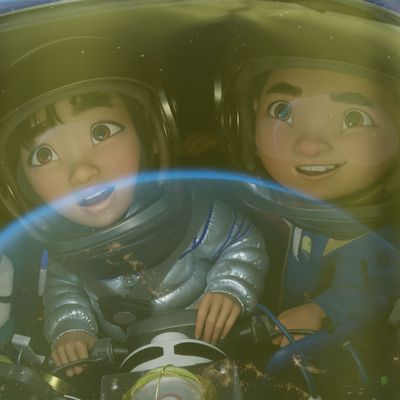
The latest volley in Netflix’s ongoing efforts to become an animation powerhouse, Over the Moon might be one of the most gorgeous animated films ever made — but it’s gorgeous in strange ways. It finds beauty as it whipsaws between wildly different tones and visual styles, working the contrast between the earthly and the celestial, between debilitating grief and gonzo fantasy. It’s a fairy-tale about loss that becomes a boisterous techno-sci-fi extravaganza, and it takes place on two worlds that, at least at first glance, couldn’t be more different. The cluttered story and the shifts in form might lose you from time to time, but the film conjures some genuinely powerful emotions.
The story follows a 12-year-old girl named Fei Fei (voiced by Cathy Ang), who has lost her beloved mother to a terminal illness, as she struggles to reconcile her continuing sorrow with the fact that her father (voiced by John Cho) is considering remarrying. In a bit of telling character dissonance, Fei Fei is a science wiz who also happens to believe fervently in Chang’e, the Chinese moon goddess whose thwarted love for the archer Houyi was one of her mom’s favorite stories. Struggling with the fact that the world expects her to move on from both her anguish and her childhood belief in a magic moon queen, Fei Fei gets the bright idea of building a rocket to the Moon, to go meet Chang’e and prove that she exists. (“I would fly beyond the stars to keep my family/If I did, I’d show my father love lasts all eternity,” she sings.) The girl’s homemade ship, cast in a massive paper lantern shell, catapulted by magnets, and powered by what appears to be a thousand firecrackers, shoots into the sky — then begins to fall back to Earth. Suddenly, a mysterious beam from the sky catches it, and the rocket is carried to the lunar surface by giant, glowing orbital Chinese imperial guardian lions.
Up until this point, director Glen Keane (the legendary Disney animator responsible for Ariel, Beast, and Aladdin, making his directorial debut here) keeps things mostly grounded. Fei Fei’s world back on Earth is warm and life-sized, filled with activity and chitchat and food (her family owns a moon cake shop), the kind of place from which animated adventures often start. But on the Moon, Fei Fei, along with her trusted rabbit sidekick and her adorably annoying stowaway future step-brother Chin (voiced by Robert G. Chiu), finds herself in the kingdom of Lunaria, a dream-like land presided over by Chang’e herself (voiced by Philippa Soo), who is not quite the romantic, elegant being of Fei Fei’s dreams but a vain, domineering, colorful rave diva. (“I’m the light every night in your world, eh/You revel to the glory of my beauty/You ready to watch me be legendary?/ Cause I’m ultra-lumi-na-ryyyy,” she sings, in one of the film’s most dazzling musical numbers.) And what started off like a mournful but fairly standard fairy-tale becomes, at least for a while, a candy-colored, throbbing extravaganza.
Visually, Lunaria is a marvel — a kaleidoscopic kingdom of surreal floating objects, tiny comet sentries, trippy giant frogs, and Angry Birds riding things that look like the light cycles from TRON: Legacy. In this lunar setting, light is not reflected but emanates from within, giving almost everyone an unreal, globular glow. It’s like you’ve fallen into the world’s biggest, most beautiful lava lamp. Chang’e is alternately decked out in futuristic party skirts and a flowing robe that feels redder and realer than anything I’ve ever seen. (The costume design, by Guo Pei, and the production design by Celine Desrumaux are, in a word, stunning.) The catchy, eclectic soundtrack (with songs by Christopher Curtis, Marjorie Duffield, and Helen Park) varies from big melodic ballads to hip hop to techno to orchestral swells. This movie is a lot.
The inspiration here is clearly The Wizard of Oz, but Fei Fei and Chin’s adventures on Lunaria don’t quite have the narrative suspense or clarity of Dorothy’s journey through Oz, and their companions aren’t nearly as distinctive or moving. But all that might be beside the point. What comes through, instead, is the girl’s inconsolable longing. The film connects Fei Fei’s need to believe in Chang’e with her conviction that her mother is still somehow present, and the goddess’s eternal love for Hou Yi with the sense of betrayal Fei Fei feels about her father’s attempts to move on. That makes no rational sense, but it makes grief sense; a late scene set in a Lunarian dimension called the Chamber of Exquisite Sadness is, indeed, exquisitely moving (and visually exquisite). The script was written by the late Audrey Wells (The Hate U Give, Under the Tuscan Sun), who passed away in 2018 after a long battle with cancer, which gives the film’s theme of grief and how it powers our hope for a world beyond our own an added depth. The story turns out to be not just about those left behind finding a way to move on, but also about those who have departed learning to move on as well. Whenever these ideas crystallize, Over the Moon becomes overwhelming.
More Movie Reviews
- The Thriller Drop Is a Perfect Addition to the Bad-First-Date Canon
- The Accountant 2 Can Not Be Taken Seriously
- Another Simple Favor Is So Fun, Until It Gets So Dumb


